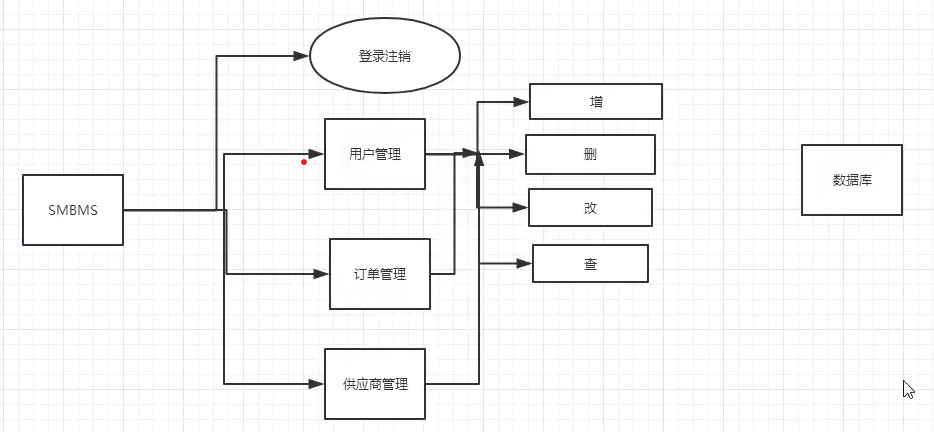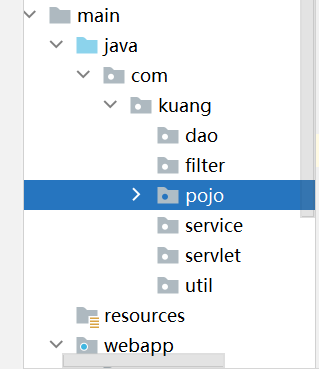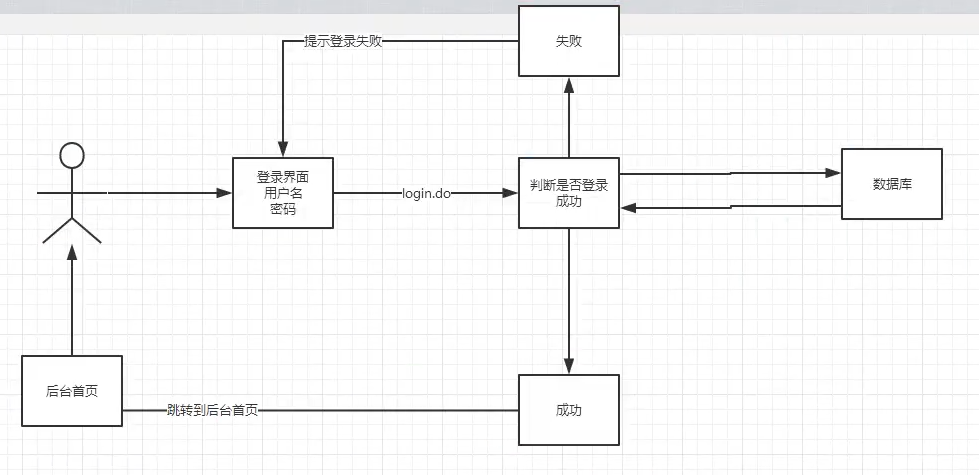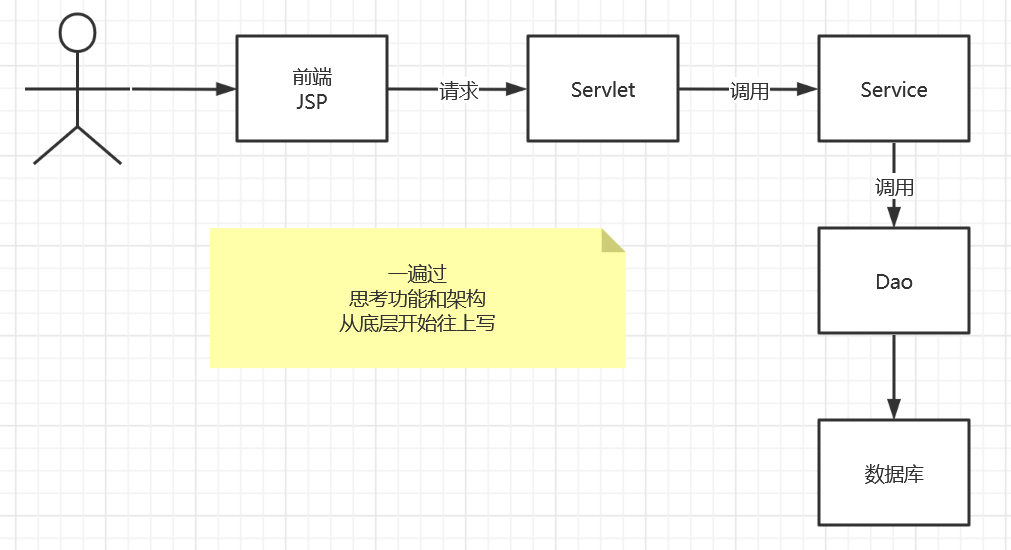smbms项目核心功能实现
SMBMS

数据库:

项目如何搭建?
考虑使用不使用Maven?依赖,Jar
1、项目搭建准备工作
搭建一个maven web项目
配置Tomcat
测试项目是否能够跑起来
导入项目中会遇到的jar包;
jsp,Servlet,mysql驱动,jstl,standard...
创建项目包结构

编写实体类;
ORM映射:表-类映射
编写基础公共类
数据库配置文件
driver=com.mysql.cj.jdbc.Driver
url=jdbc:mysql://localhost:3306?useUnicode=true&characterEncoding=UTF-8&useSSL=true&setServiceTime=GMT
username=root
password=123456
编写数据库的公共类
//操作数据库的公共类
public class BaseDao {
private static String driver;
private static String url;
private static String username;
private static String password; //静态代码块,类加载的时候就初始化了
static {
Properties properties = new Properties();
//通过类加载器读取对应的资源
InputStream is = BaseDao.class.getClassLoader().getResourceAsStream("db.properties"); try {
properties.load(is);
} catch (IOException e) {
e.printStackTrace();
} driver = properties.getProperty("driver");
url = properties.getProperty("url");
username = properties.getProperty("username");
password = properties.getProperty("password");
}
//获取数据库的连接
public static Connection getConnection(){
Connection connection = null;
try {
Class.forName("driver");
connection = DriverManager.getConnection(url, username, password);
} catch (Exception e) {
e.printStackTrace();
}
return connection;
} //编写查询公共类
public static ResultSet execute(Connection connection,String sql,Object[] params,ResultSet resultSet,PreparedStatement preparedStatement) throws SQLException {
//预编译的sql,在后面直接执行就可以了
preparedStatement = connection.prepareStatement(sql); for (int i = 0; i < params.length; i++) {
//setObject,占位符从1开始,但是我们的数组是从0开始!
preparedStatement.setObject(i+1,params[i]);
} resultSet = preparedStatement.executeQuery();
return resultSet;
} //编写增删改公共方法
public static int execute(Connection connection, String sql, Object[] params, PreparedStatement preparedStatement) throws SQLException {
preparedStatement = connection.prepareStatement(sql); for (int i = 0; i < params.length; i++) {
//setObject,占位符从1开始,但是我们的数组是从0开始!
preparedStatement.setObject(i+1,params[i]);
} int updateRows = preparedStatement.executeUpdate();
return updateRows;
} //释放资源
public static boolean closeResource(Connection connection,PreparedStatement preparedStatement,ResultSet resultSet){
boolean flag = true; if (resultSet!=null){
try {
resultSet.close();
//GC回收
resultSet = null;
} catch (SQLException e) {
e.printStackTrace();
flag = false;
}
} if (preparedStatement!=null){
try {
preparedStatement.close();
//GC回收
preparedStatement = null;
} catch (SQLException e) {
e.printStackTrace();
flag = false;
}
} if (connection!=null){
try {
connection.close();
//GC回收
connection = null;
} catch (SQLException e) {
e.printStackTrace();
flag = false;
}
} return flag;
}
}
编写字符编码过滤器
导入静态资源
2、登录功能实现

编写前端页面
设置首页
<!--设置欢迎页面-->
<welcome-file-list>
<welcome-file>login.jsp</welcome-file>
</welcome-file-list>
编写dao层得到用户登录的接口
DAO:data access object
//得到要登录的用户
public User getLoginUser(Connection connection,String userCode) throws SQLException;
编写dao接口的实现类
public class UserDaoImpl implements UserDao{
public User getLoginUser(Connection connection, String userCode) throws SQLException { PreparedStatement pstm = null;
ResultSet rs = null;
User user = null; if (connection!=null){
String sql = "select * from smbms_user where userCode=?";
Object[] params = {userCode}; rs = BaseDao.execute(connection, pstm, rs, sql, params); if (rs.next()){
user = new User();
user.setId(rs.getInt("id"));
user.setUserCode(rs.getString("userCode"));
user.setUserName(rs.getString("userName"));
user.setUserPassword(rs.getString("userPassword"));
user.setGender(rs.getInt("gender"));
user.setBirthday(rs.getDate("birthday"));
user.setPhone(rs.getString("phone"));
user.setAddress(rs.getString("address"));
user.setUserRole(rs.getInt("userRole"));
user.setCreatedBy(rs.getInt("createdBy"));
user.setCreationDate(rs.getTimestamp("creationDate"));
user.setModifyBy(rs.getInt("modifyBy"));
user.setModifyDate(rs.getTimestamp("modifyDate"));
}
BaseDao.closeResource(null,pstm,rs); } return user;
}
}
业务层接口
//用户登录
public User login(String userCode,String password);
业务层实现类
public class UserServiceImpl implements UserService { //业务层都会调用dao层,所以我们要引入Dao层;
private UserDao userDao; public UserServiceImpl() {
userDao = new UserDaoImpl();
} public User login(String userCode, String password) {
Connection connection = null;
User user = null; connection = BaseDao.getConnection();
try {
user = userDao.getLoginUser(connection, userCode);
} catch (SQLException e) {
e.printStackTrace();
} finally {
BaseDao.closeResource(connection, null, null);
}
return user;
}
}
编写Servlet
public class LoginServlet extends HttpServlet { //Servlet:控制层,调用业务层代码 @Override
protected void doGet(HttpServletRequest req, HttpServletResponse resp) throws ServletException, IOException {
System.out.println("LoginServlet--start...."); //获取用户名和密码
String userCode = req.getParameter("userCode");
String userPassword = req.getParameter("userPassword"); //和数据库中的密码进行对比,调用业务层;
UserService userService = new UserServiceImpl();
User user = userService.login(userCode, userPassword); //这里已经把登录的人给查出来了 if (user!=null){ //查有此人,可以登录
//将用户的信息放到Session中;
req.getSession().setAttribute(Constants.USER_SESSION,user);
//跳转到主页
resp.sendRedirect("jsp/frame.jsp");
}else {//查无此人,无法登录
//转发回登录页面,顺带提示它,用户名或者密码错误
req.setAttribute("error","用户名或者密码不正确");
req.getRequestDispatcher("login.jsp").forward(req,resp);
}
} @Override
protected void doPost(HttpServletRequest req, HttpServletResponse resp) throws ServletException, IOException {
doGet(req, resp);
}
}
注册Servlet
<!--Servlet-->
<servlet>
<servlet-name>LoginServlet</servlet-name>
<servlet-class>com.kuang.servlet.user.LoginServlet</servlet-class>
</servlet>
<servlet-mapping>
<servlet-name>LoginServlet</servlet-name>
<url-pattern>/login.do</url-pattern>
</servlet-mapping>
测试访问,确保以上功能成功!
3、登录功能优化
注销功能:
思路:移除Session,返回登录页面
public class LogoutServlet extends HttpServlet {
@Override
protected void doGet(HttpServletRequest req, HttpServletResponse resp) throws ServletException, IOException {
//移除用户的Constants.USER_SESSION
req.getSession().removeAttribute(Constants.USER_SESSION);
resp.sendRedirect(req.getContextPath()+"/login.jsp");//返回登录页面
}
@Override
protected void doPost(HttpServletRequest req, HttpServletResponse resp) throws ServletException, IOException {
doGet(req, resp);
}
}
注册xml
<servlet>
<servlet-name>LogoutServlet</servlet-name>
<servlet-class>com.kuang.servlet.user.LogoutServlet</servlet-class>
</servlet>
<servlet-mapping>
<servlet-name>LogoutServlet</servlet-name>
<url-pattern>/jsp/logout.do</url-pattern>
</servlet-mapping>
登录拦截优化
编写一个过滤器并注册
public class SysFilter implements Filter {
public void init(FilterConfig filterConfig) throws ServletException {
}
public void doFilter(ServletRequest req, ServletResponse resp, FilterChain chain) throws IOException, ServletException {
HttpServletRequest request = (HttpServletRequest) req;
HttpServletResponse response = (HttpServletResponse) resp;
//过滤器,从Session中获取用户,
User user = (User) request.getSession().getAttribute(Constants.USER_SESSION);
if (user==null){ //已经被移除或者注销了,或者未登录
response.sendRedirect("/smbms/error.jsp");
}else {
chain.doFilter(req,resp);
}
}
public void destroy() {
}
}
<!--用户登录过滤器-->
<filter>
<filter-name>SysFilter</filter-name>
<filter-class>com.kuang.filter.SysFilter</filter-class>
</filter>
<filter-mapping>
<filter-name>SysFilter</filter-name>
<url-pattern>/jsp/*</url-pattern>
</filter-mapping>
测试,登录,注销权限,都要保证OK!
4、密码修改
导入前端素材
<li><a href="${pageContext.request.contextPath }/jsp/pwdmodify.jsp">密码修改</a></li>
写项目,建议从底层向上写

UserDao接口
//修改当前用户密码
public int updatePwd(Connection connection,int id,int password) throws SQLException;
UserDao接口实现类
//修改当前用户密码
public int updatePwd(Connection connection, int id, int password) throws SQLException { PreparedStatement pstm = null;
int execute = 0;
if (connection!=null){
String sql = "update smbms_user set userPassword = ? where id = ?";
Object params[] = {password,id};
execute = BaseDao.execute(connection, pstm, sql, params);
BaseDao.closeResource(null,pstm,null);
}
return execute;
}
UserService层
//根据用户ID修改密码
public boolean updatePwd(int id, int pwd);
UserService实现类
public boolean updatePwd(int id, int pwd) {
Connection connection = null;
boolean flag = false;
//修改密码
try {
connection = BaseDao.getConnection();
if (userDao.updatePwd(connection,id,pwd)>0){
flag = true;
}
} catch (SQLException e) {
e.printStackTrace();
}finally {
BaseDao.closeResource(connection,null,null);
}
return flag;
}
Servlet记得实现复用,需要提取出方法!
@Override
protected void doGet(HttpServletRequest req, HttpServletResponse resp) throws ServletException, IOException {
String method = req.getParameter("method");
if (method.equals("savepwd")&&method!=null){
this.updatePwd(req, resp);
}
} public void updatePwd(HttpServletRequest req, HttpServletResponse resp){
//从Session里面拿ID;
Object o = req.getSession().getAttribute(Constants.USER_SESSION);
String newpassword = req.getParameter("newpassword"); System.out.println("UserServlet"+newpassword); boolean flag = false; //if (o!=null && !StringUtils.isNullOrEmpty(newpassword)){
if (o!=null && newpassword!=null){
UserService userService = new UserServiceImpl();
flag = userService.updatePwd(((User) o).getId(), newpassword);
if (flag){
req.setAttribute("message","修改密码成功,请退出,使用新密码登录");
//密码修改成功,移除当前Session
req.getSession().removeAttribute(Constants.USER_SESSION);
}else {
req.setAttribute("message","密码修改失败");
//密码修改成功,移除当前Session
}
}else {
req.setAttribute("message","新密码有问题");
}
try {
req.getRequestDispatcher("pwdmodify.jsp").forward(req,resp);
} catch (ServletException e) {
e.printStackTrace();
} catch (IOException e) {
e.printStackTrace();
}
}
<servlet>
<servlet-name>UserServlet</servlet-name>
<servlet-class>com.kuang.servlet.user.UserServlet</servlet-class>
</servlet>
<servlet-mapping>
<servlet-name>UserServlet</servlet-name>
<url-pattern>/jsp/user.do</url-pattern>
测试
优化密码修改使用Ajax;
阿里巴巴的fastjson
<!-- https://mvnrepository.com/artifact/com.alibaba/fastjson -->
<dependency>
<groupId>com.alibaba</groupId>
<artifactId>fastjson</artifactId>
<version>1.2.79</version>
</dependency>
后台代码修改
//修改密码
public void updatePwd(HttpServletRequest req, HttpServletResponse resp){
//从Session里面拿ID;
Object o = req.getSession().getAttribute(Constants.USER_SESSION);
String newpassword = req.getParameter("newpassword"); System.out.println("UserServlet"+newpassword); boolean flag = false; //if (o!=null && !StringUtils.isNullOrEmpty(newpassword)){
if (o!=null && newpassword!=null){
UserService userService = new UserServiceImpl();
flag = userService.updatePwd(((User) o).getId(), newpassword);
if (flag){
req.setAttribute("message","修改密码成功,请退出,使用新密码登录");
//密码修改成功,移除当前Session
req.getSession().removeAttribute(Constants.USER_SESSION);
}else {
req.setAttribute("message","密码修改失败");
//密码修改成功,移除当前Session
}
}else {
req.setAttribute("message","新密码有问题");
}
try {
req.getRequestDispatcher("pwdmodify.jsp").forward(req,resp);
} catch (ServletException e) {
e.printStackTrace();
} catch (IOException e) {
e.printStackTrace();
}
} //验证旧密码,session中有用户的密码
public void pwdModify(HttpServletRequest req, HttpServletResponse resp){
//从Session里面拿oldpassword;
Object o = req.getSession().getAttribute(Constants.USER_SESSION);
String oldpassword = req.getParameter("oldpassword"); //万能的Map : 结果集
HashMap<String, String> resultMap = new HashMap<String,String>();
if (o==null){ //Session失效了,session过期了
resultMap.put("result","sessionerror");
}else if (StringUtils.isNullOrEmpty(oldpassword)){ //输入的密码为空
resultMap.put("result","error");
}else {
String userPassword = ((User) o).getUserPassword(); //Session中用户的密码
if (oldpassword.equals(userPassword)){
resultMap.put("result","true");
}else {
resultMap.put("result","false");
}
} try {
resp.setContentType("application/json");
PrintWriter writer = resp.getWriter();
//JSONArray 阿里巴巴的JSON工具类,转换格式
/*
resultMap = ["result","sessionerror","result","error"]
Json格式 = {key:value}
*/
writer.write(JSONArray.toJSONString(resultMap));
writer.flush();
writer.close();
} catch (IOException e) {
e.printStackTrace();
}
}
测试
5、用户管理实现
思路:

导入分页的工具类
用户列表页面导入
userlist.jsp
rollpage.jsp
1、获取用户数量
UserDao
//根据用户名或者角色查询用户总数
public int getUserCount(Connection connection,String username,int userRole) throws SQLException;
UserDaoImpl
//根据用户名或者角色查询用户总数【最难理解的SQL】
public int getUserCount(Connection connection, String username, int userRole) throws SQLException {
PreparedStatement pstm = null;
ResultSet rs = null;
int count = 0; if (connection!=null){
StringBuffer sql = new StringBuffer();
sql.append("select count(1) as count from smbms_user u,smbms_role r where u.userRole = r.id");
ArrayList<Object> list = new ArrayList<Object>();//存放我们的参数 if (!StringUtils.isNullOrEmpty(username)){ //拼接sql语句
sql.append(" and u.userName like ?");
list.add("%"+username+"%"); //index:0
}
if (userRole>0){
sql.append(" and u.userRole = ?");
list.add(userRole); //index:1
} //怎么把list转换为数组
Object[] params = list.toArray(); System.out.println("UserDaoImpl->getUserCount"+sql.toString()); //输出最后完整的SQL语句 rs = BaseDao.execute(connection, pstm, null, sql.toString(), params); if (rs.next()){
count = rs.getInt("count");//从结果集中获取最终的数量
}
BaseDao.closeResource(null,pstm,rs);
} return count;
}
UserService
//查询记录数
public int getUserCount(String username, int userRole);
UserServiceImpl
//查询记录数
public int getUserCount(String username, int userRole) {
Connection connection = null;
int count = 0;
try {
connection = BaseDao.getConnection();
count = userDao.getUserCount(connection, username, userRole);
} catch (SQLException e) {
e.printStackTrace();
} finally {
BaseDao.closeResource(connection,null,null);
} return count;
}
2、获取用户列表
userdao
//通过条件查询-userList
public List<User> getUserList(Connection connection, String username, int userRole, int currentPageNo, int pageSize) throws Exception;
userdaoImpl
public List<User> getUserList(Connection connection, String username, int userRole, int currentPageNo, int pageSize) throws Exception {
PreparedStatement pstm = null;
ResultSet rs = null;
List<User> userList = new ArrayList<User>(); if (connection!=null){
StringBuffer sql = new StringBuffer();
sql.append("select u.*,r.roleName as userRoleName from smbms_user u,smbms_role r where u.userRole = r.id");
List<Object> list = new ArrayList<Object>();//存放我们的参数 if (!StringUtils.isNullOrEmpty(username)){ //拼接sql语句
sql.append(" and u.userName like ?");
list.add("%"+username+"%"); //index:0
}
if (userRole>0){
sql.append(" and u.userRole = ?");
list.add(userRole); //index:1
} //在数据库中,分页使用 limit startIndex,pageSize; 总数
//当前页 (当前页-1)*页面大小
//0,5 1 0 01234
//5,5 2 5 56789
//10,5 3 10 sql.append(" order by creationDate DESC limit ?,?");
currentPageNo = (currentPageNo-1)*pageSize;
list.add(currentPageNo);
list.add(pageSize); //怎么把list转换为数组
Object[] params = list.toArray(); System.out.println("sql-->"+sql.toString()); //输出最后完整的SQL语句 rs = BaseDao.execute(connection, pstm, null, sql.toString(), params); while (rs.next()){
User user = new User();
user.setId(rs.getInt("id"));
user.setUserCode(rs.getString("userCode"));
user.setUserName(rs.getString("userName"));
user.setGender(rs.getInt("gender"));
user.setBirthday(rs.getDate("birthday"));
user.setPhone(rs.getString("phone"));
user.setUserRole(rs.getInt("userRole"));
user.setUserRoleName(rs.getString("userRoleName"));
userList.add(user);
}
BaseDao.closeResource(null,pstm,rs);
}
return userList;
}
userService
//通过条件查询-userList
public List<User> getUserList(String queryUserName, int queryUserRole, int currentPageNo, int pageSize);
userServiceImpl
public List<User> getUserList(String queryUserName, int queryUserRole, int currentPageNo, int pageSize) {
Connection connection = null;
List<User> userList = null;
try {
connection = BaseDao.getConnection();
userList = userDao.getUserList(connection, queryUserName, queryUserRole,currentPageNo,pageSize);
} catch (Exception e) {
e.printStackTrace();
} finally {
BaseDao.closeResource(connection,null,null);
} return userList;
}
3、获取角色操作
为了我们职责统一,可以把角色的操作单独放在一个包中,和POJO类对应
RoleDao
public interface RoleDao {
//获取角色列表
public List<Role> getRoleList(Connection connection) throws SQLException;
}
RoleDaoImpl
public List<Role> getRoleList(Connection connection) throws SQLException {
PreparedStatement pstm = null;
ResultSet resultSet = null;
ArrayList<Role> roleList = new ArrayList<Role>();
if (connection!=null){
String sql = "select * from smbms_role";
Object[] params = {};
resultSet = BaseDao.execute(connection, pstm, resultSet, sql, params);
while (resultSet.next()){
Role _role = new Role();
_role.setId(resultSet.getInt("id"));
_role.setRoleCode(resultSet.getString("roleCode"));
_role.setRoleName(resultSet.getString("roleName"));
roleList.add(_role);
}
BaseDao.closeResource(null,pstm,resultSet);
}
return roleList;
}
RoleService
//获取角色列表
public List<Role> getRoleList();
RoleServiceImpl
public class RoleServiceImpl implements RoleService{
//引入Dao
private RoleDao roleDao = null;
public RoleServiceImpl(){
roleDao = new RoleDaoImpl();
}
public List<Role> getRoleList() {
Connection connection = null;
List<Role> roleList = null;
try {
connection = BaseDao.getConnection();
roleList = roleDao.getRoleList(connection);
} catch (SQLException e) {
e.printStackTrace();
} finally {
BaseDao.closeResource(connection,null,null);
}
return roleList;
}
}
4、用户显示的Servlet
- 获取用户前端的数据(查询)
- 判断请求是否需要执行,看参数的值判断
- 为了实现分页,需要计算出当前页面和总页面,页面大小...
- 用户列表展示
- 返回前端
//重点,难点
public void query(HttpServletRequest req, HttpServletResponse resp){
//查询用户列表
//从前端获取数据:
String queryUserName = req.getParameter("queryname");
String temp = req.getParameter("queryUserRole");
String pageIndex = req.getParameter("pageIndex");
int queryUserRole = 0;
//获取用户列表
UserServiceImpl userService = new UserServiceImpl();
List<User> userList = null;
//第一次走这个请求,一定是第一页,页面大小固定的;
int pageSize = 5;//可以把这个写到配置文件中,方便后期修改;
int currentPageNo = 1;
if (queryUserName == null){
queryUserName = ""; //不手动赋值会产生空指针异常
}
if (temp != null && !temp.equals("")){
queryUserRole = Integer.parseInt(temp); //给查询赋值!0,1,2,3
}
if (pageIndex != null){
currentPageNo = Integer.parseInt(pageIndex);
}
//获取用户的总数(分页:上一页,下一页的情况)
int totalCount = userService.getUserCount(queryUserName,queryUserRole);
//总页数支持
PageSupport pageSupport = new PageSupport();
pageSupport.setCurrentPageNo(currentPageNo);
pageSupport.setPageSize(pageSize);
pageSupport.setTotalCount(totalCount);
int totalPageCount = pageSupport.getTotalPageCount(); //总共有几页
//控制首页和尾页
//如果页面要小于1了,就显示第一页的东西
if (totalPageCount<1){
currentPageNo = 1;
}else if (currentPageNo>totalPageCount){ //当前页面大于了最后一项;
currentPageNo = totalPageCount;
}
//获取用户列表展示
userList = userService.getUserList(queryUserName, queryUserRole, currentPageNo, pageSize);
req.setAttribute("userList",userList);
RoleServiceImpl roleService = new RoleServiceImpl();
List<Role> roleList = roleService.getRoleList();
req.setAttribute("roleList",roleList);
req.setAttribute("totalCount",totalCount);
req.setAttribute("currentPageNo",currentPageNo);
req.setAttribute("totalPageCount",totalPageCount);
req.setAttribute("queryUserName",queryUserName);
req.setAttribute("queryUserRole",queryUserRole);
//返回前端
try {
req.getRequestDispatcher("userlist.jsp").forward(req,resp);
} catch (ServletException e) {
e.printStackTrace();
} catch (IOException e) {
e.printStackTrace();
}
}
小黄鸭调试法
6、SMBMS架构分析

smbms项目核心功能实现的更多相关文章
- discuz论坛apache日志hadoop大数据分析项目:清洗数据核心功能解说及代码实现
discuz论坛apache日志hadoop大数据分析项目:清洗数据核心功能解说及代码实现http://www.aboutyun.com/thread-8637-1-1.html(出处: about云 ...
- Chrome扩展开发之四——核心功能的实现思路
目录: 0.Chrome扩展开发(Gmail附件管理助手)系列之〇——概述 1.Chrome扩展开发之一——Chrome扩展的文件结构 2.Chrome扩展开发之二——Chrome扩展中脚本的运行机制 ...
- ES6,ES2105核心功能一览,js新特性详解
ES6,ES2105核心功能一览,js新特性详解 过去几年 JavaScript 发生了很大的变化.ES6(ECMAScript 6.ES2105)是 JavaScript 语言的新标准,2015 年 ...
- Shiro 核心功能案例讲解 基于SpringBoot 有源码
Shiro 核心功能案例讲解 基于SpringBoot 有源码 从实战中学习Shiro的用法.本章使用SpringBoot快速搭建项目.整合SiteMesh框架布局页面.整合Shiro框架实现用身份认 ...
- Python交互K线工具 K线核心功能+指标切换
Python交互K线工具 K线核心功能+指标切换 aiqtt团队量化研究,用vn.py回测和研究策略.基于vnpy开源代码,刚开始接触pyqt,开发界面还是很痛苦,找了很多案例参考,但并不能完全满足我 ...
- Spring框架的IOC核心功能快速入门
2. 步骤一:下载Spring框架的开发包 * 官网:http://spring.io/ * 下载地址:http://repo.springsource.org/libs-release-local/ ...
- Bing词典vs有道词典比对测试报告——功能篇之核心功能
必应词典vs有道词典 核心功能对比 从应用的UI布局来看,这两款软件的功能如下: 相同 不同 必应词典 词典.例句.翻译 百科 有道词典 词典.例句.翻译 应用 就词典类软件来说,词典是最核心的功能. ...
- Linux学习-核心编译的前处理与核心功能选择
硬件环境检视与核心功能要求 根据自己的需求来确定编译的选项 保持干净原始码: make mrproper 我们还得要处理一下核心原始码底下的残留文件才行!假设我们是第一次 编译, 但是我们不清楚到底下 ...
- 自己实现spring核心功能 一
聊聊spring spring对于java开发者来说,是最熟悉不过的框架了,我们日常开发中每天都在使用它.它有着各种各样的好处,简单易用,得心应手... ... 我们一说到spring就会讲到ioc ...
随机推荐
- 字符串工具类ToStringBuilder常用方法介绍
一.简介与引入 1.ToStringBuilder.HashCodeBuilder.EqualsBuilder.ToStringStyle.ReflectionToStringBuilder.Co ...
- 关于启动bash提示‘bash: export: `//这是新的': not a valid identifier’的解决办法
学习linux以来将centos改的也不少了,也不知道这个问题是由于那个修改来的.最近改bash的操作环境配置文件,用到了~/.bashrc这个文件,发现里面被我修改过. 那是当年安装fcitx输入法 ...
- WebGPU图形编程(4):构建一个彩色的正方形<学习引自徐博士教程>
本节我们来复原一个彩色的正方形,前提告知,本节的shaders和main的代码从结构上有调整,我会更加详细的描述每行的代码意思: 源代码下载地址:https://github.com/jack1232 ...
- gin中如何记录日志和错误日志
package main import ( "github.com/gin-gonic/gin" "io" "os" ) func main ...
- Ansible + shell 实现部署fastdfs+nginx 实现图片服务器并提供动态缩放功能;
因为公司阿里服务器变动几次,手动部署了好几次fastdfs+nginx,于是就想到了自动化部署,以下为脚本内容,由于只是想把着功能实现,并未有完完整的判断逻辑: 以下为ansible-playbook ...
- VUE3 之 组件间事件通信 - 这个系列的教程通俗易懂,适合新手
1. 概述 相关定律告诉我们:这个世界上的任何事物之间都会存在一定联系,"城门失火,殃及池鱼"就是一个很好的例子.因此如果我们能够尽早发现这些看不见的联系,就能很好的解决更多遇见的 ...
- maven常用打包命令
常用maven命令 执行与构建过程(编译,测试,打包)相关的命令必须进入pom.xml所在位置执行 mvn clean:清理(打包好的程序放在生成的名为target的文件中,清理即删除文件中打包好的程 ...
- 学习JAVAWEB第十一天
今天以及明天做登录案例,复习所学知识.
- C#运算符重载---逐步地分析与理解
1.什么是运算符重载 定义:(百科定义)就是把已经定义的.有一定功能的操作符进行重新定义,来完成更为细致具体的运算等功能.操作符重载可以将概括性的抽象操作符具体化,便于外部调用而无需知晓内部具体运算过 ...
- git删除误传的.idea文件
问题: 提交项目的时候忘记添加.gitignore文件,误上传了文件(如.idea)如何解决?如何删除Gitee地址上项目的.idea文件?(本文以.idea文件夹举例) 拉取项目 拉取项目 git ...
